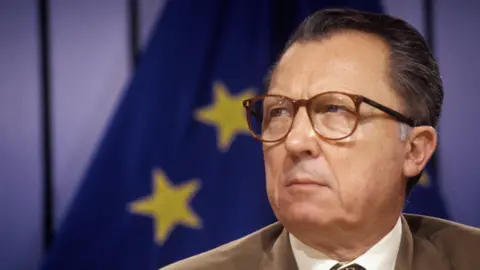Jacques Delors: Tributes pour in for architect of modern EU
 Getty Images
Getty ImagesPolitical leaders have paid tribute to former European Commission President Jacques Delors, who has died aged 98.
Serving from 1985 to 1995, Delors helped create the single market allowing the free movement of people, goods and services around the bloc.
He also laid the groundwork for the single European currency, the euro.
Former British Prime Minister Boris Johnson described him as a "towering political figure" and "architect of the modern European Union".
"Whatever you say about the modern EU - it is the house that Jacques built," Mr Johnson said.
Delors served three terms as European Commission president, longer than anyone else.
His tenure at the top of the EU contributed to the single market and eventually the euro but also the creation of the Schengen agreement for travel and the Erasmus programme for student exchanges.
French President Emmanuel Macron praised Delors as a "statesman with a French destiny" and an "inexhaustible craftsman of our Europe".
"His commitment, his ideals and his righteousness will always inspire us," he said. "I salute his work and his memory and share the pain of his loved ones."
German Chancellor Olaf Scholz hailed Delors as a "visionary" and an "architect of the EU as we know it".
But Delors' vision of an "ever closer union" was not universally shared.
Most notably he is remembered for his clashes with former UK Prime Minister Margaret Thatcher, from whom his ideas faced stiff opposition.
Thatcher described the 1989 Delors report calling for economic and monetary union as unacceptable, because it would wrest many economic policies from the hands of the British Parliament.
Lord Clarke of Nottingham, who as Kenneth Clarke served in Thatcher's cabinet, told BBC Radio 4's PM programme she shared Delors' vision of a single market, but suspected him of also wanting a political union, which she was against.
"The truth was that Jacques Delors and Margaret Thatcher deeply disliked each other personally, they hated each other for personal and political reasons," he added.
Former UK opposition leader Neil Kinnock told the programme he was a "very polite, calm, highly intelligent man, a problem-solver" and not a "fanatical federalist" as Thatcher tried to portray him.
Ursula von der Leyen, current president of the European Commission, said Delors had been a "visionary who made our Europe stronger".
Another of Delors' successors, former Portuguese Prime Minister José Manuel Barroso who served as head of the EU's executive branch between 2004 and 2014, praised his negotiating skills.
"He was very pragmatic in the method, the way he would achieve results, but at the same time he had a vision," Mr Barroso said.
European Council President Charles Michel described him as a "great Frenchman and a great European" who had "entered history as one of the builders of our Europe".
Tributes have also come from outside of Europe, including from US Secretary of State Antony Blinken.
"Delors transformed Europe through tireless service to the idea of a Europe whole and free," he wrote on social media.
On leaving his post in 1995, Delors declined to stand for the French presidency, despite a huge lead in the polls.
He remained true to his federalist ideals. More recently, he warned of the dangers of populism in Europe, calling for bold moves in the wake of Brexit.
